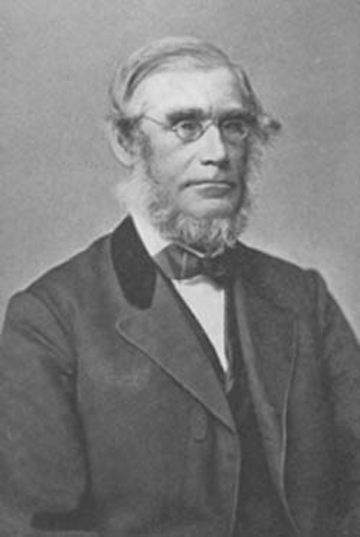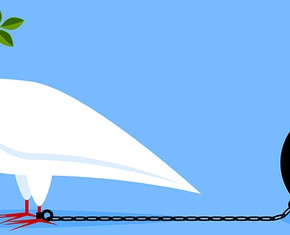The views expressed in our content reflect individual perspectives and do not represent the authoritative views of the Baha'i Faith.
Have you ever heard of the American abolitionist Stephen S. Foster, or the Persian poetess and feminist Tahirih?
In the 1840’s this man and this woman, living in two completely different parts of the world, confronted their communities with acts of outrageous disruption. They stirred controversies and raised issues still debated today about the best means and tactics for fundamental social change.
The current debate about kneeling during the national anthem and the uses of flags are as old as the debates of the 19th century. Change is always disruptive, and as Frederick Douglass, another agitator of the 19th century, astutely observed, “If there is no struggle, there is no progress. Those who profess to favor freedom, and yet depreciate agitation, are men who want crops without plowing up the ground. They want rain without thunder and lightning. They want the ocean without the awful roar of its many waters. This struggle may be a moral one; or it may be a physical one; or it may be both moral and physical; but it must be a struggle. Power concedes nothing without a demand. It never did and it never will.”

Stephen Symonds Foster
Stephen S. Foster, labeled “the New Hampshire fanatic” by the abolitionist newspaper, the Liberator, habitually entered churches and interrupted sermons to challenge the institution of slavery. A tall man with a deep voice, he wore rimless spectacles and was considered warm and witty. However, as a friend observed, “He never trifled. You felt he had a great work to do, and could not come down to your worldly level.”
That great work—the immediate and absolute abolition of slavery—became Foster’s mission. He publicly called out the Christian churches for excusing and justifying slavery’s existence. He also denounced the churches’ discriminatory practice of separating the races while they claimed to be saving black souls.
Sunday after Sunday, Foster entered American churches, waited until the minister started his sermon, and then asked to speak against slavery. Denied and told to be quiet and sit down, he pressed on, calling ministers a “brotherhood of thieves.” Uproar followed, and he was grabbed and tossed out again and again. On two occasions, he was thrown out of second-story windows. He was also arrested.
But he persisted, even over the objections of his colleagues and friends. William Lloyd Garrison, the leader of the abolitionist cause who called the Constitution of the United States “a covenant with death and an agreement with hell,” said Foster’s behavior was “too extreme.” Even Frederick Douglass said Foster’s tactics were “needlessly offensive.” For Foster these objections missed the point. He meant to confront and offend by using the sacred spaces of those who used those same spaces to discriminate and enslave. Foster’s critics argued that his tactics were not persuasive, suggesting that when you attack a sacred symbol or a sacred space, the offended stop listening and can’t be moved. Agitators like Foster meant to startle, shock and awaken the complacent who were morally asleep.
Foster was not killed, but a remarkable and courageous woman who lived across the world in 19th century Persia sacrificed her life for her cause. She was a key figure in the early years of the Babi and Baha’i Faith, and just a few years after Foster started his campaign, she disrupted a gathering of religious cohorts by tearing off her veil in a room of men.

Tahirih
In the context of her time, Tahirih’s act was revolutionary. Raised as a Muslim in a traditional society dominated by men, she converted to a new religion that proclaimed the equality of men and women. She believed that this principle required a bold affirmation, and she acted, using a symbol that she knew would generate the reaction she received—shock and condemnation, even by her friends.
Tahirih was ready for the new age of equality, and they were not as ready. According to one account, one man was so appalled he cut his own throat. Her fellow Babi disciple, called Quddus, denounced her as “the author of heresy,” defending his positon by claiming, “I am free to follow the promptings of my own conscience. I am not subject to the will and promptings of my fellow disciples.”
Her critics used the same anti-agitator arguments used in America and elsewhere: you are making things worse. By offending you are subjecting us to scorn and ridicule. You need to stay in your proper place and not challenge our sacred traditions.
Interestingly enough, these new believers were willing to die for their new Faith, but culturally they were not ready to tolerate a woman without a veil. Wait, they argued. Not now. Go away and be quiet.
Not everyone can be a Stephen Foster or a Tahirih. Their behavior requires a bewildering and sometimes maddening combination of personal characteristics: inner conviction that can seem self-righteous; courage that can seem reckless; audacity that can seem obnoxious; perseverance that can seem stubborn. Often, they are called fools, dangerous fools. Few of us have the courage and conviction it takes to be them—to suddenly rip away the curtains of deceit and injustice that blind our eyes:
Tear asunder the veils and curtains of these dogmas, remove these accumulated, suffocating increments, dispel these dark impenetrable clouds, that the sun of reality may shine from the horizon of eternity. – Abdu’l-Baha, Divine Philosophy, p. 162.
But what is important is that we understand their role, their essential role in the transformation of society. They are men and women willing to serve in the vanguard of change, to be first, and they demand our attention. They will often be accused as unpatriotic, un-Christian, unfeminine, anti-American, and anti-Islam. Even their friends, colleagues, and family members sometimes reject and publicly excoriate them as traitors and dangers to the very foundations of their societies.
Here’s the truth: they are dangerous. They’re dangerous because they challenge the essential assumptions of cultures, assumptions that have been accepted and often unexamined for decades, if not centuries. We may question their tactics, but all too often critics take their eyes off the prize—justice—as they rail about the flag or the veil or some other symbol.
So although I will defend the right, I disagree with taking a knee during a national anthem. Why? Because you can be sure that the kneeling down will be remembered, and the cause itself will be ignored or forgotten during the patriotic uproar. The gesture, to me, seems ineffective.
But I also remain grateful that there are those who are willing to make these sacrifices on my behalf; and it is not for me to question their devotion or their patriotism. In fact, they inspire my admiration, even as they annoy and discomfort me.
There are times, especially at the beginning of any period of revolutionary reform, when political solutions and the concomitant moral compromises are not appropriate or even possible—and there are times when only ripping off the veil will be noticed and remembered. For good and for ill, disruptive acts do matter—they can set us on a course to a new civilization.
You May Also Like
Comments

















I can't believe this would be published in a manner that so blatantly obscures the truth.
“ I think this peaceful nonviolent and quiet protest is very effective. And I think Tahireh would be there taking the knee too if she were in that position.”